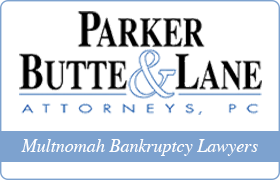Fairview Credit & Debt Lawyer, Oregon
Sponsored Law Firm
-
 x
x

Click For More Info:
Parker, Butte & Lane
-
Parker Butte & Lane
1336 E Burnside St Ste 200 Portland, OR 97214 » view mapPortland, OR Bankruptcy Lawyer Changing Lives, One Case At A Time
Our attorneys provide complete and personalized representation and counsel for corporate and nonprofit clients as well as for individuals.
800-811-9561  Richard J. Parker Portland, OR
Richard J. Parker Portland, ORAttorney At Law - OR, 1980
Golden Gate University School of Law
Adam M. Weiner
✓ VERIFIEDBankruptcy & Debt, Credit & Debt, Collection
Adam Weiner has been practicing law in Oregon since May 1998. After successfully spending many years representing individuals in different types of... (more)
Timothy James Zimmerman
Commercial Real Estate, Civil Rights, Credit & Debt, Collection
Status: In Good Standing Licensed: 37 Years
Timothy J Zimmerman
Commercial Real Estate, Civil Rights, Credit & Debt, Collection
Status: In Good Standing Licensed: 37 Years
Douglas Ricks
Corporate, Bankruptcy, Credit & Debt, Consumer Protection
Status: In Good Standing Licensed: 20 Years
Steve D Larson
Class Action, Intellectual Property, Employment, Credit & Debt
Status: In Good Standing Licensed: 38 Years
Conde T. Cox
Litigation, Prosecution, Credit & Debt, Bankruptcy, Federal
Status: In Good Standing Licensed: 44 Years
Ronald T Adams
Civil Rights, Credit & Debt, Intellectual Property
Status: In Good Standing Licensed: 48 Years


 Richard J. Parker Portland, OR
Richard J. Parker Portland, OR
